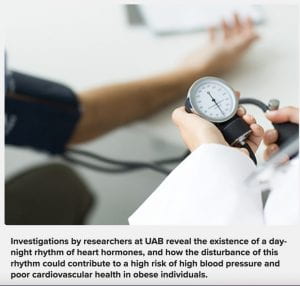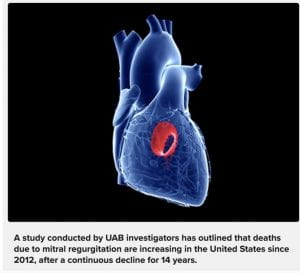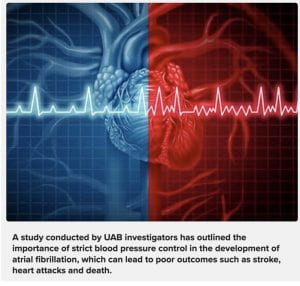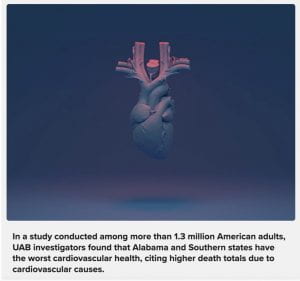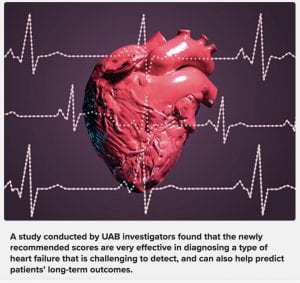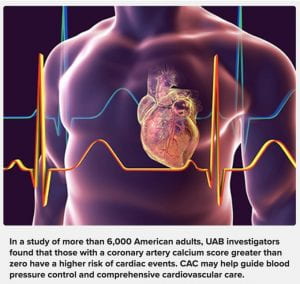
Naman Shetty, MD joined Arora Translational Laboratory in May of 2022. Since joining, he had the opportunity to present his research “Sex Differences in the Association of Multi-Ethnic Genome-Wide Blood Pressure Polygenic Risk Score with Hypertension” in the 9th Annual CCVC Symposium and was granted 1st place.
Drs. Arora (Professor) and Parcha (Fellow) from the Division of Cardiovascular Disease recently found that Southeastern states in the U.S., including Alabama, has a 16 percent higher death rate due to cardiovascular causes compared to the rest of the country. Researchers conclude access to health care, education, and addressing disparities could reduce this trend.

Garima Arora M.D., (Associate Professor, Cardiovascular Disease) was named Fellow of the American Society of Echocardiography. This honour is reserved for practitioners who demonstrate excellence through education, research, leadership, and volunteerism in the field of cardiovascular ultrasound.

Division of Cardiovascular Disease fellow, Vibhu Parcha, M.D., Assistant Professor Pankaj Arora, M.D., and colleagues led a study that finds using genetic information to prescribe medications following the placement of a heart stent reduces the risk of future cardiac events by 99 per cent. The study suggests employing genetic testing could improve treatments and health outcomes.
A series of studies recently published in the Journal of the American College of Cardiology by University of Alabama at Birmingham researchers describes the reasons behind low levels of natriuretic peptides in obese individuals. NP’s are beneficial hormones produced by the heart that is responsible for the regulation of blood pressure and the overall cardiovascular and metabolic health of humans. This study also addresses how the disturbance of an individual’s day-night, or diurnal, the rhythm of these hormones contributes to poor cardiovascular health in obese individuals.
A new study published in the Mayo Clinic Proceedings by University of Alabama at Birmingham researchers shows that deaths related to mitral regurgitation, a common disease of heart valves, are now increasing since 2012 after showing an initial decline between 1999 and 2012. The death rates were highest among women, older individuals (≥85 years), Black individuals, and those living in the non-metropolitan regions and in the western United States.
Vibhu Parcha, M.D., a clinical research fellow in the UAB Division of Cardiovascular Disease, says this study was an extensive surveillance exercise at a national level to look into the implications of advancements in the treatment of mitral regurgitation, a common heart valve disease. Mitral regurgitation is frequently seen in up to 10 per cent of individuals more than 75 years of age and is associated with a high risk of mortality due to cardiovascular causes.
A new study published by University of Alabama at Birmingham researchers in the international journal Hypertension shows strict blood pressure control could reduce the risk of developing atrial fibrillation by 22 per cent. However, even after strict blood pressure control, this heart rhythm abnormality can be deadly.
Vibhu Parcha, M.D., a physician-scientist in UAB’s Division of Cardiovascular Disease, explained that uncontrolled high blood pressure leads to the development of atrial fibrillation, making the control of blood pressure in these individuals very important. Atrial fibrillation is the most common heart rhythm abnormality frequently seen in patients with high blood pressure and can lead to stroke, heart failure and even death.
In a recent study published in the Mayo Clinic Proceedings, the University of Alabama at Birmingham researchers found that there is significant geographic heterogeneity in the distribution of cardiovascular disease risk factors such as diabetes, hypertension, high blood cholesterol levels, obesity, smoking, lack of physical activity and unhealthy diet, across the United States.
These risk factors are disproportionately concentrated among those living in the Southern states and contribute to the higher prevalence of cardiovascular death in this region.
Vibhu Parcha, M.D., a clinical research fellow in the UAB Division of Cardiovascular Disease and the first author of this study, explained that, while there is empiric understanding about poor cardiovascular health status in the Southern states, there is no contemporary data quantifying this and looking at how the cardiovascular health has changed in the last decade.
- Acute respiratory failure mortality increases in United States and may worsen with COVID-19 pandemic
A new study published in Chest by the University of Alabama at Birmingham researchers showed that deaths related to acute respiratory failure are increasing in the United States, while mortality due to acute respiratory distress syndrome has shown a lack of decline in the last five years. The death rates were highest among older individuals (≥65 years), non-Hispanic Blacks, those living in the non-metropolitan regions and in the Southern United States.
Vibhu Parcha, M.D., a clinical research fellow in the Division of Cardiovascular Disease, says this study was a deep dive into the current trends and geographic variation in deaths due to acute respiratory failure and ARDS in the United States. Severe COVID-19 patients frequently develop acute respiratory failure necessitating admission to intensive care settings. ARDS is the primary cause of death among patients with COVID-19.
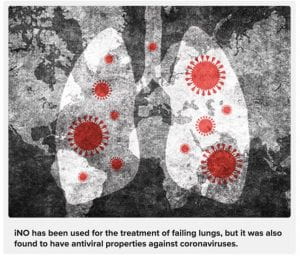
The University of Alabama at Birmingham has been selected to begin enrolling patients in an international study assessing the use of inhaled nitric oxide (iNO) to improve outcomes for COVID-19 patients with severely damaged lungs.
Currently, there are no approved treatment options available against the SARS-CoV-2 virus, which causes COVID-19, although many medications are currently being tested to see if they may be effective. Acute respiratory distress syndrome, a severe form of lung failure, is the leading cause of death in COVID-19.

A new study from a team of researchers at the University of Alabama at Birmingham published in Circulation has found that there is a 23 percent risk in reduction of all-cause mortality with use of implantable cardioverter-defibrillator therapy in patients with non-ischemic cardiomyopathy, a disease that exhibits inappropriate ventricular hypertrophy or dilatation.
The study provides further support to the current American Heart Association and American College of Cardiology guidelines and challenges the recently published DANISH trial in the New England Journal of Medicine.

A study recently published in the Journal of the American Heart Association is prompting headlines like “Calcium supplements might hurt your heart.” The new research suggests dietary calcium in the form of supplements, but not calcium-rich foods, might have a harmful impact on the heart. UAB Assistant Professor in the Division of Cardiology Pankaj Arora, M.D., says there is not a reason to panic. “How I interpret the study is, with a calcium intake of 400 mg to 1,400 mg, there is no association with coronary artery calcification,” Arora said.
Arora says the new study looked at changes in CAC over the span of 10 years in nearly 5,500 adults ages 45-84. Calcium supplements were associated with a 22 per cent increase in CAC.
A new study published in JAMA Cardiology by the University of Alabama at Birmingham researchers shows that a key protein, N-terminal pro-B-type-NP (NTproBNP) that is released from the heart is almost 35 per cent lower in African-Americans than in Caucasians, and predicts the risk of death, particularly cardiovascular mortality similarly in both races.
Pankaj Arora, M.D., assistant professor in the Division of Cardiovascular Disease, explained that the human heart is an endocrine organ and produces hormones called natriuretic peptides. Natriuretic peptides are routinely used as “gold-standard” biomarkers for the diagnosis and prognosis of cardiovascular diseases, especially heart failure, in clinical practice.
Consuming a high-carbohydrate load may have an acute and detrimental effect on heart function, according to a study published in the Journal of the American College of Cardiology.
A team of researchers from the University of Alabama at Birmingham, Massachusetts General Hospital and Vanderbilt University studied 33 individuals who were given an acute carbohydrate load in the form of a 294-kilocalorie shake. They studied the subjects’ blood levels for six hours looking for a number of reactions, chief among them whether this acute metabolic challenge could alter the heart’s production of atrial natriuretic peptide. ANP is a hormone that helps the body get rid of excess salt and reduces blood pressure.
A new study published in Circulation Research by the University of Alabama at Birmingham researchers shows that young, healthy African American individuals have lower natriuretic peptide levels as compared to whites. The study also showed that a decreased process, and increased breakdown, maybe a reason behind the racial differences in NP levels. Furthermore, they found that whites had a greater decrease in their NP levels after a high-carbohydrate challenge, compared to African Americans.
Nirav Patel, M.D., a resident in the Department of Medicine, explained that the human heart is also an endocrine organ that produces hormones called natriuretic peptides. Lower levels of NPs have been suggested as significant contributors to the development of cardiometabolic diseases such as diabetes and hypertension in populations with low NP levels.

A new study published in the American Journal of Medicine by the University of Alabama at Birmingham indicates that economic resurgence was not associated with improvement in cardiovascular health among American adults after the great economic recession of 2008-2009. Moreover, cardiovascular health appears to be further deteriorating for American adults, particularly those with high- and low socioeconomic status.

New research shows that proposed cuts to Medicare spending — which covered nearly 90 per cent of payments for transcatheter aortic valve replacement procedures from 2012-2014 — could impact the number of those cases performed in the future to treat severe aortic stenosis.

Physician-scientists from the University of Alabama at Birmingham using “big-data” recently summarized in the Journal of the American Heart Association the prevalence of cardiovascular manifestations, rates of defibrillator placement (ICD) and predictors of in-hospital mortality in sarcoidosis — a disorder that affects multiple organs.
Sarcoidosis is a systemic illness with a strong propensity to involve the cardiovascular system. It is the growth of tiny collections of inflammatory cells — granulomas — in different parts of the body, most commonly the lungs, lymph nodes, eyes and skin. Utilizing the largest in-patient database — the National Inpatient Sample — a team of researchers from UAB identified more than half a million sarcoidosis hospitalizations without any present or past history of ischemic heart disease from 2005 through 2014 in the United States.

Researchers at the University of Alabama at Birmingham are developing and testing a new peptide that they hope will lead to better treatment options for familial hypercholesterolemia.
FH is a genetic condition that results from the body’s inability to clear low-density lipoprotein (LDL), or bad cholesterol, from the blood. This results in startlingly high cholesterol levels. There are two forms of FH: heterozygous FH (HeFH) and homozygous HoFH, which is the most serious type of FH. If untreated, HoFH often causes heart disease in the early teen years and sometimes even in early childhood.

Drs. Arora (Professor) from theDivision of Cardiovascular Disease have been awarded a $3.7 million grant from the National Heart Lung and Blood Institute to study how genetically determined differences in natriuretic peptide levels (heart hormones) regulate the handling of glucose metabolism and use of energy while resting and while exercising.

One might wonder what type of environment is necessary for an institution to not only attract great physicians and researchers but also produce them.
A quick conversation with clinical research fellow, Vibhu Parcha, M.D., (Instructor, Cardiovascular Disease) offers answers. As an early-career physician-scientist, his goal is to improve understanding of human physiology through clinically focused patient-oriented research. He is also an American Heart Association Early Career Investigator Award Finalist (2020) and an American College of Cardiology Alabama Chapter 2020 and 2021 Ami Iskandrian Young Investigator Award recipient.
In a recent study published in the ESC Heart Failure by the University of Alabama at Birmingham researchers, two newly recommended scores are very effective in diagnosing heart failure with preserved ejection fraction, a type of heart failure that is challenging to detect. The scores may also be helpful to predict long-term outcomes in these patients.
Heart failure is a contributing cause of death in nearly 14 per cent of all deaths in the United States and costs the nation about $31 billion a year. HFpEF, a type of heart failure, is a highly prevalent condition and accounts for nearly half of the nearly 6.2 million heart failure patients in the United States. Despite its being ubiquitous, HFpEF is challenging to diagnose and identify early.
A new study published in the Nature Scientific Reports by University of Alabama at Birmingham researchers shows children with COVID-19 may not display typical symptoms such as fever, cough and shortness of breath, therefore more screening and vigilance are required.
Researchers also found that children with COVID-19 may develop poor clinical outcomes such as requiring hospitalization, critical care services and mechanical ventilation.
In a recent study published in Hypertension, the University of Alabama at Birmingham researchers found that coronary artery calcium score is an excellent predictor of potential cardiovascular events like heart failure, stroke and heart attacks.
The researchers found that individuals who are not recommended treatment as per the current guidelines may still have a high risk of cardiovascular events, which is captured by their high CAC score.
A new study published in the Mayo Clinic Proceedings: Innovations, Quality & Outcomes by the University of Alabama at Birmingham researchers showed that Black individuals have a disproportionately higher COVID-19 mortality burden across all of the United States, which is driven by a high incidence of COVID-19 infection. They found that there are key geographic differences in the distribution of health determinants and COVID-19 mortality patterns.
Vibhu Parcha, M.D., a clinical research fellow in the Division of Cardiovascular Disease, says this study was a deep dive into systemic racism in health, which may be driving the high mortality burden seen among Black individuals. The impact of race in health care has been studied in comorbidities such as diabetes, high blood pressure, high cholesterol, preexisting medical conditions (heart attack, cancer and lung disease), health behaviours (smoking, alcohol use, physical activity) and socioeconomic factors (health insurance status, household income and education). Click here

A new study published in the Mayo Clinic Proceedings by University of Alabama at Birmingham researchers shows that, in a nationwide survey of young American adults age 18-44 years, nearly a third of non-Hispanic Blacks and a fifth of non-Hispanic whites and Mexican Americans have hypertension.
Vibhu Parcha, M.D., a clinical research fellow in the UAB Division of Cardiovascular Disease, says that exposure to high blood pressure early in life causes changes in the structure and function of the cardiovascular system, thereby putting individuals at an increased risk of fatal conditions like stroke, heart attacks and heart failure. Click here

A new study published in Circulation by University of Alabama at Birmingham researchers showed that Blackheart failure patients have worse prognoses even after achieving biomarker-based treatment goals.
Vibhu Parcha, M.D., a clinical research fellow in the Division of Cardiovascular Disease, says prior studies have shown that those heart failure patients who take medications regularly and have their NT-proBNP levels — a heart failure biomarker — less than 1,000 pg/mL do better in terms of being admitted to hospital for worsening of heart failure or dying due to cardiac causes.
In a recent study published in the Journal of the American Heart Association by the University of Alabama at Birmingham researchers, findings indicate that among patients with heart failure, obesity is associated with a higher risk of heart failure hospitalization or death due to cardiac causes. However, achieving biomarker-based treatment goals in heart failure improves the prognosis for patients irrespective of their obesity status.
Heart failure is one of the leading causes of death in the United States and contributes to nearly 14 per cent of all deaths in the U.S. Highly efficacious medications are now available for the management of this disease.
CABG is a commonly performed, lifesaving surgery for patients with heart attacks and severe disease of the heart’s blood vessels. Avoiding a surgery like CABG due to fears of COVID-19 has “drastic implications.”A new study published in the Journal of Thoracic and Cardiovascular Surgery: Open by the University of Alabama at Birmingham researchers shows a decline in patients’ needing coronary artery bypass graft surgery during the COVID-19 pandemic.
Researchers report there has been a decline of roughly 36 per cent in the number of patients undergoing a CABG; but reassuringly, the risk of death and other poor outcomes remains identical among those who underwent surgery in 2020.

Physician-scientists from the University of Alabama at Birmingham and the University of Minnesota have published findings that conclude a substantial burden of new-onset atrial fibrillation was observed after transcatheter aortic valve implantation and aortic valve replacement.
Their findings were recently published in the prestigious journal JAMA Internal Medicine.
Transcatheter aortic valve implantation, or TAVI, is a minimally invasive procedure used to treat aortic stenosis, which is a narrowing of the heart valve that connects the heart to the central blood vessel, the aorta. This problem typically afflicts people in the middle and elderly age groups. Surgical aortic valve replacement has been the gold standard treatment for many years for patients with aortic stenosis. TAVI was developed in the last 15 years and was initially used only for patients unable to undergo open heart surgery to receive surgical aortic valve replacement. Click here
Heart disease is the No. 1 cause of death in the United States, killing nearly 610,000 people every year. That is one out of every four deaths. High blood pressure, high cholesterol and smoking are key risk factors for heart disease. About half of Americans (47 per cent) have at least one of these three risk factors.
The University of Alabama at Birmingham physicians say that even people with no obvious risk factors can still have underlying heart disease or heart-related issues. Pankaj Arora, M.D., assistant professor of cardiology, says a person’s heart disease risk is affected by both environment and genetics.

A new study published in the Journal of the American College of Cardiology by the University of Alabama at Birmingham researchers shows that implementation of the 2013 American College of Cardiology/American Heart Association cholesterol guidelines resulted in the improvement of cholesterol levels among American adults, especially those on cholesterol-lowering drugs.
Nirav Patel, M.D., a resident in the Department of Medicine, explained that high cholesterol levels are implicated in the development of heart diseases and the occurrence of stroke. The 2013 guidelines encouraged clinicians to treat individuals with a ‘risk-based approach rather than focusing on a target cholesterol level. The new guidelines divided people into four major groups to encourage the treatment of high cholesterol levels in these high-risk groups, alongside a choice of a heart-healthy lifestyle.

Physician-scientists from the University of Alabama at Birmingham have recently assessed the incidence, or new-onset, of cardiovascular disease and in-hospital deaths in patients hospitalized with severe sepsis, a clinical syndrome related to infection and organ dysfunction.
The findings, published in the American Journal of Cardiology, show that the frequency, characteristics and outcomes of patients with severe sepsis who develop cardiovascular events are not well-known due to a lack of large epidemiologic studies in this population. Click here

A team of researchers from the University of Alabama at Birmingham School of Medicine have used nationwide databases to evaluate recent trends in heart transplantation, left ventricular device implantation, in-hospital mortality, the economic burden of these procedures, and the impact of proposed Medicare and Medicaid cuts on the end-stage heart failure landscape. The results, published today in JACC: Heart Failure, provide an unfavourable impact that the predicted $473 billion and $1.3 trillion federal cuts on Medicare and Medicaid spending over the next decade could have for a heart transplant and LVAD-implanted patients.

A new study published in JCI Insight by the University of Alabama at Birmingham researchers shows that the ability to predict the risk of heart failure using N-terminal pro-B-type natriuretic peptide (NTproBNP) levels is reduced in African Americans with obesity or impaired kidney function. NTproBNP is a peptide that is widely used clinically to predict heart failure.
Nirav Patel, M.D., a heart failure fellow in the Division of Cardiovascular Disease, explained that the human heart is an endocrine organ and produces hormones called natriuretic peptides. Natriuretic peptides, especially NTproBNP, are routinely used as “gold-standard” biomarkers for the diagnosis and prognosis of cardiovascular diseases such as heart failure in clinical practice.
